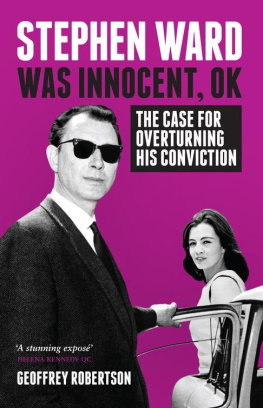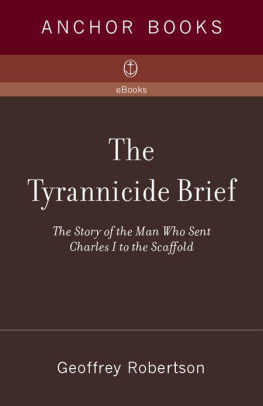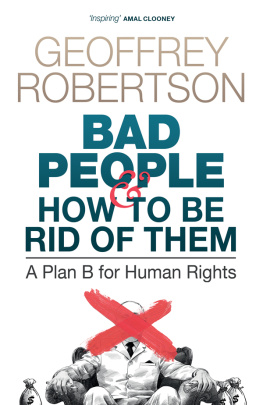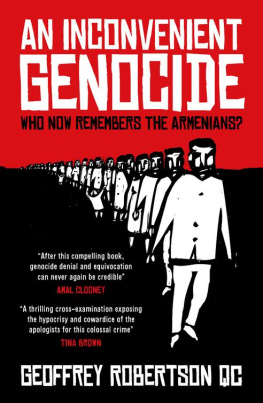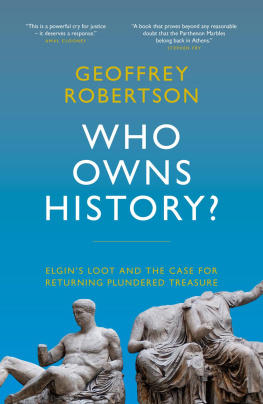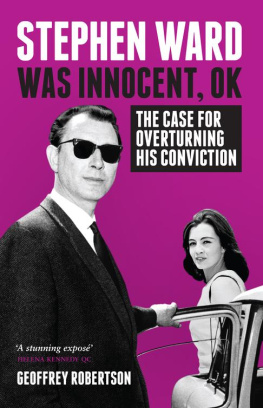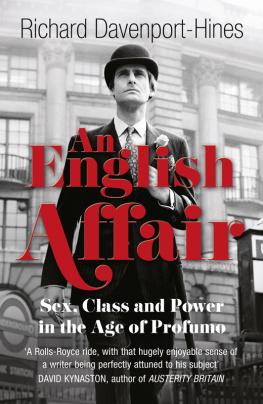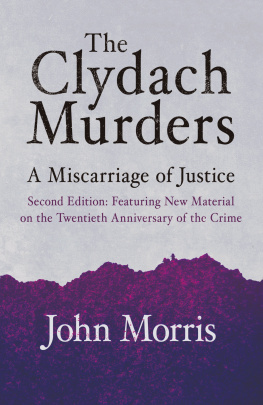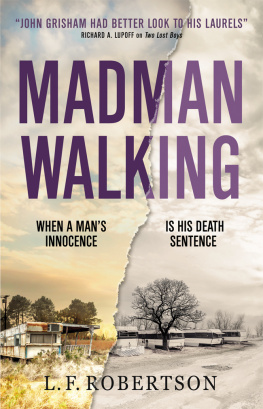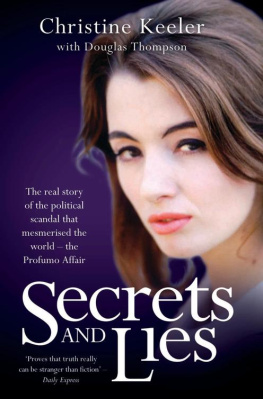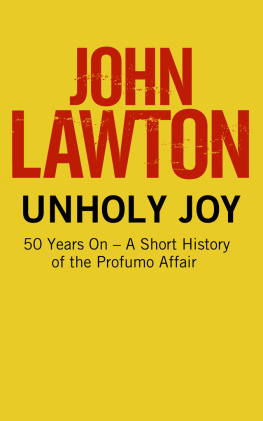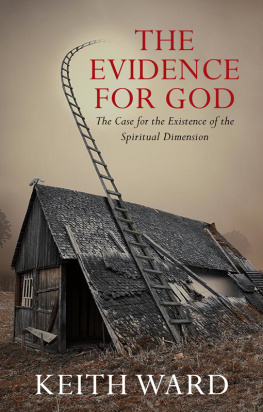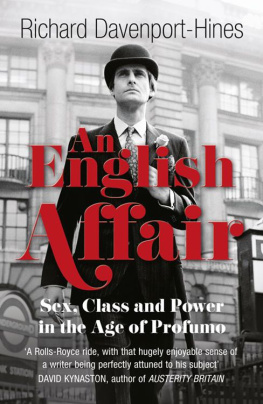Geoffrey Robertson - Stephen Ward Was Innocent, OK: The Case for Overturning his Conviction
Here you can read online Geoffrey Robertson - Stephen Ward Was Innocent, OK: The Case for Overturning his Conviction full text of the book (entire story) in english for free. Download pdf and epub, get meaning, cover and reviews about this ebook. year: 2013, publisher: Biteback, genre: Non-fiction. Description of the work, (preface) as well as reviews are available. Best literature library LitArk.com created for fans of good reading and offers a wide selection of genres:
Romance novel
Science fiction
Adventure
Detective
Science
History
Home and family
Prose
Art
Politics
Computer
Non-fiction
Religion
Business
Children
Humor
Choose a favorite category and find really read worthwhile books. Enjoy immersion in the world of imagination, feel the emotions of the characters or learn something new for yourself, make an fascinating discovery.
- Book:Stephen Ward Was Innocent, OK: The Case for Overturning his Conviction
- Author:
- Publisher:Biteback
- Genre:
- Year:2013
- Rating:4 / 5
- Favourites:Add to favourites
- Your mark:
- 80
- 1
- 2
- 3
- 4
- 5
Stephen Ward Was Innocent, OK: The Case for Overturning his Conviction: summary, description and annotation
We offer to read an annotation, description, summary or preface (depends on what the author of the book "Stephen Ward Was Innocent, OK: The Case for Overturning his Conviction" wrote himself). If you haven't found the necessary information about the book — write in the comments, we will try to find it.
Geoffrey Robertson: author's other books
Who wrote Stephen Ward Was Innocent, OK: The Case for Overturning his Conviction? Find out the surname, the name of the author of the book and a list of all author's works by series.
Stephen Ward Was Innocent, OK: The Case for Overturning his Conviction — read online for free the complete book (whole text) full work
Below is the text of the book, divided by pages. System saving the place of the last page read, allows you to conveniently read the book "Stephen Ward Was Innocent, OK: The Case for Overturning his Conviction" online for free, without having to search again every time where you left off. Put a bookmark, and you can go to the page where you finished reading at any time.
Font size:
Interval:
Bookmark:
 In memory of John Mortimer CONTENTS T he funeral of Stephen Ward, at Mortlake Cemetery in August 1963, attracted only six mourners and they included his brothers and his solicitor. This distinguished osteopath and skilled portrait artist, a favourite of Londons fashionable society throughout the 1950s, had died by his own hand. At the grave lay a wreath, made up of one hundred white carnations, and a card signed by Kenneth Tynan. It bore the simple inscription To Stephen Ward, Victim of Hypocrisy That was true enough. Ward was put on trial at a time of moral panic, when the Christian complacency that had settled over British society after the war had been severely shaken by the Profumo affair. John Profumo, Minister for War in Harold Macmillans Conservative government, had enjoyed a brief affair with Christine Keeler and had lied about it in a personal statement to Parliament. Profumos confession, a few months later, blew the lid off a pressure cooker of rumour and allegation hitherto pent-up by draconian English libel law. Many thought the moral fabric of family life was under real threat from this explosion of sexual scandal, and readily identified Stephen Ward as the cause, both factually (he had introduced Profumo to Keeler, and later exposed Profumos lie to Parliament) and figuratively he was a successful professional with a promiscuous lifestyle and no belief in God. Punishing him, or at least removing him from the society he had apparently corrupted, offered the possibility of propitiation, even regeneration. In the meantime, casualties of the Profumo affair included the flailing Harold Macmillan, who resigned a few months later, and a failing Tory government, narrowly beaten by Harold Wilson in 1964. Contrary to Lord Hailshams pompous prediction, a great party had been brought down by a confessed liar and a woman of easy virtue.The choice of Stephen Ward for the role of scapegoat was made by Home Secretary Sir Henry Brooke, who summoned the head of MI5 and the Police Commissioner of Scotland Yard and requested them, in effect, to get Ward for any offence he could possibly have committed. MI5 baulked when the Home Secretary suggested an Official Secrets Act prosecution for the very good reason that there was no evidence. The Police Commissioner said there was insufficient evidence for an immoral earnings charge, too, but he volunteered to find some. With unprecedented zeal, the doctors phones were bugged (with the authorisation of Brooke himself), his home and consulting rooms were put under 24-hour surveillance, and his patients were intercepted by police officers as they left his surgery and asked whether they had witnessed anything improper. Dozens of prostitutes were rounded up and pressured to say bad things about Ward; Keeler herself was interviewed twenty-four times in desperate attempts to implicate him in something felonious.These efforts produced insufficient evidence of any crime, although the police thought them relevant to some seedy-sounding sexual offences relating to pimping (then called poncing) and procuring abortions, and women for other men. Treasury Counsel (barristers who prosecute for the government) rustled up an indictment, and a rubber-stamp magistrate committed him for trial. It took place over seven days in Court No. 1 at the Old Bailey. Outside, crowds booed and hissed and banged their umbrellas on his car. Inside, the court recoiled as the prosecutor denounced him as a thoroughly filthy fellow and an utterly immoral man. The Lord Chief Justice and two fellow appeal judges arranged that evidence which should have secured his acquittal would be hidden from the jury, and his trial judge misdirected them in a way that led to his conviction on counts of which he was palpably innocent.Stephen Ward appears now as a British Dreyfus a reasonable comparison in the sense that both men were innocent victims of public prejudice and politically expedient prosecutions, although at least the Dreyfus affair involved a serious crime that had actually been committed (by someone else), while Ward was charged with crimes for which there was no evidence that he or anyone else had committed. Dreyfus had his champions at the time, like Victor Hugo, who were able to identify the real culprit and secure the victims release. In Wards case, there were half a dozen books written at the time and half a dozen which have appeared in the half-century since, and all have condemned the prosecution and the trial. They had been written by journalists some, outstanding practitioners of that trade, like Ludovic Kennedy and Phillip Knightley, but with limited knowledge of criminal law and procedure. They exposed behaviour that led to a miscarriage of justice, without fully explaining how and why the professional culture at the time allowed the law to produce such a fraudulent result.The more I studied the case and talked with older barristers and thought back to my own youthful experiences which began at the Old Bailey a few years later, the more it was possible to read between the lines of the journalists notebooks and court reporters papers. It struck me that the Ward case was an example of what Dr H. V. Evatt, in his analysis of the trial of the Tolpuddle Martyrs, described as injustice within the law ( The Tolpuddle Martyrs , Sydney University Press, 2009 edn). He demonstrated how, at a time of moral or political panic (in that case, at the incipient notion of trade unionism), laws and legal procedures could be manipulated to produce an unjust result notwithstanding a seeming compliance with all forensic formalities.In Wards case, the verdict was reached after manipulation in some respects, disregard of legal rules in force at the time, and through the legal professions lack of consciousness then of what fairness in a trial requires. There are quite a few occasions in the following pages where I comment with relief that this could not happen now. Justice in Britain has improved, as a result of the Irish miscarriages (the Birmingham Six, the Guildford Four etc.) and the work of Chief Justices like Peter Taylor and Tom Bingham to repair the system that produced them. But trial by jury remains vulnerable, especially at times of moral panic. The importance of quashing the conviction of Stephen Ward is not only to right a historic wrong, but to serve as a warning against unfairly investigating and prosecuting scapegoats in order to expiate scandals which are the responsibility of others who cannot be held to account. Public outrage at the sexual marauding of Jimmy Savile and the tabloid misconduct exposed by Leveson has led to massive police enquiries which are bringing many celebrities, journalists and whistleblowers into the Old Bailey dock: they can be tried fairly, but only if the lessons of Stephen Wards case have been learnt.This book began as an idea murmured at the funeral of David Frost, who first appeared on television screens in 1963, that crucible year in which Dr Stephen Ward was tried and convicted. Was it not time, some distinguished mourners wondered, to demand a royal pardon? The discussion was sparked by the presence of Andrew Lloyd Webber, who had become so passionately convinced of Wards innocence that he had written a musical about him, shortly to be directed by Sir Richard Eyre. Andrew asked my opinion, and I said I would take a look at the case and get back to him. This book is my response. Geoffrey Robertson QC Doughty Street ChambersNovember 2013 L ate in the afternoon of Wednesday 31 July 1963, Dr Stephen Ward was convicted at the Old Bailey on two counts alleging that he lived on the earnings of a prostitute, namely those of Christine Keeler (Count 1) and Mandy Rice-Davies (Count 2). He was not in the dock but comatose in hospital. The previous night he had attempted suicide, because (as he said in a note) after Marshalls [the judges] summing-up, Ive given up all hope. He died on Saturday 3 August, without regaining consciousness. Many observers of the proceedings thought the convictions did not reflect the evidence and that the trial was unfair, and this book will show that it breached basic standards of justice, even in 1963 and certainly in 2013.Unlike most other wrongful convictions, caused by factors like mistaken eyewitnesses, defence incompetence, police malpractice etc., the Ward case is so disturbing because of the role played by the government in initiating it and by the Court of Appeal (indeed, by the Lord Chief Justice) in hiding from the Old Bailey jury a crucial fact that Christine Keeler was a perjurer which would have secured Wards acquittal, at least on Count 1. These reasons in particular require the verdict, even after half a century, to be overturned by the Court of Appeal. Not just in the interest of restoring posthumously Dr Wards reputation although there is compelling evidence that he was innocent of all the offences with which he was charged but in the interest of acknowledging how and why our system of justice buckled under pressure from politicians and the press and made a scapegoat of a man who was prosecuted for his promiscuity, and not for any real criminal offence.Until 1995, the only means of remedying a wrongful but long past conviction was by way of a royal pardon, an arcane process which does not overturn the conviction but formally forgives the crime and consigns it to legal oblivion. It can still be used for historic injustices, and was so used in 2006 to pardon the ghosts of some 300 shell-shocked soldiers executed during the First World War for crimes of cowardice or desertion. But oblivion is not appropriate for Dr Ward his unjust conviction deserves not only to be quashed but also to be remembered as a warning to all law enforcers against ever again allowing themselves to be panicked and pressured into giving a citizen an unfair trial.That the public good would be served by a procedure for examining the correctness of old convictions was accepted by Parliament after a number of miscarriages had done serious damage to the reputation of British justice, particularly jury convictions brought in at a time of public hostility to defendants (the Birmingham Six, the Guildford Four, Judith Ward and others). A Royal Commission, established on the very day in 1991 that the Birmingham Six were released after seventeen years in prison, recommended that there should be a new statutory body, the Criminal Cases Review Commission (CCRC), charged with examining dodgy convictions.Bentley was a mentally ill young man who had been hanged, despite the jurys recommendation for mercy, for allegedly encouraging his accomplice to shoot a policeman. The quashing of his conviction brought some closure to surviving relatives, but most importantly the Court of Appeals judgment explained and requited an injustice, perpetrated by a former Chief Justice, which had long disturbed the public conscience. The case of Ruth Ellis (the last woman to be hanged in the UK) was ruled inappropriate for a reference, because there was no dispute that she had killed her perfidious lover, In these two cases, clearly there was no further need to right a wrong, and the expense and work involved in a Court of Appeal reference would have little justification. It did, however, in the case of James Hanratty, whose guilt had been disputed ever since his conviction for the A6 murder back in 1961. The CCRC reference forty years later providentially produced DNA evidence to prove his guilt, thus ending a long campaign by journalist Paul Foot, who had written a book arguing for his innocence. The case of Stephen Ward manifestly falls on the Bentley/Hanratty side of the line: his prosecution has struck all who have investigated it as an appalling misuse of state power, which has never been acknowledged and could, at a future time of moral panic, be repeated.The CCRC was established by the Criminal Appeal Act of 1995. It is empowered to refer a case to the Court of Appeal if it considers there is a real possibility that the conviction would not, on reconsideration, be upheld. Normally the convictions it refers will already have been dismissed by that court, and of course, back in 1963 Stephen Ward did not and could not appeal he had taken his own life before the verdict. However, Section 13(2) of the Act permits the commission to make a reference without a previous appellate judgment if there appear to be exceptional circumstances to justify it. For reasons that will appear, the circumstances of this case could scarcely be more exceptional.The Court of Appeal must, under guidelines established in Derek Bentleys reference, judge the conduct of the trial and the context of the summing-up according to standards of fairness that apply today, even if they were not recognised at the time of the original trial. However, the statute under which the charges were brought (in Wards case, Section 30 of the Sexual Offences Act, 1958) must be applied as the law stood in 1963. Under current legal rules and procedures directed to achieving fair trial, there can be no doubt that there is a real possibility indeed a substantial probability that the Court of Appeal today would quash this conviction, if the CCRC gives it the opportunity to do so by referring the case.This book sets out the case for overturning Stephen Wards conviction, notwithstanding the passage of time. It falls into five parts. The essential background to the trial (Chapter 2) concerns Wards role in the Profumo affair. The Minister for War had a brief relationship with Christine Keeler at a time when she was living in Wards flat and was friendly with a Soviet defence attach, Captain Ivanov. Subsequently, Profumo denied this in a personal statement to Parliament, but was later forced to confess that he had lied and to resign. Harold Macmillan was forced to step down as Prime Minister, and the imbroglio contributed significantly to the Conservatives, who had been in power since 1951, narrowly losing the 1964 election. Wards role was pivotal: he was living (platonically) with Keeler and introduced her to both Profumo and Ivanov. Later he covered up for the minister, but then told the truth and forced Profumos resignation.It is necessary to understand some of this historical background in order to appreciate the forces at work, in Parliament, press and the security services, which came to impinge on the police investigation of Ward and on his trial in July 1963. It is necessary to appreciate that the proceedings began not (as in almost every other criminal case) with a complaint to or action by the police, but with a demand by the Home Secretary, made at a secret meeting with the head of MI5 and the Commissioner of the Metropolitan Police. The police thereafter behaved with extraordinary zeal never before or since have 140 potential witnesses been interviewed (Keeler twenty-four times) in an effort to drum up evidence against a suspected pimp. Chapter 3 explains how the committal proceedings ensured that some scandalous but inadmissible prosecution evidence was published throughout the world just three weeks before the trial started. I examine the trial itself, with its extraordinary and, as we now know, extraordinarily untruthful evidence, in Chapter 4. It is necessary to analyse the summing-up which drove Ward to suicide, and the machinations of the Court of Appeal which prevented the jury from hearing the truth about Christine Keeler, the prosecutions star witness. In Chapter 5 I set out all the grounds which, separately and together, prove that the trial was unfair even by the standards of 1963, and certainly by the standards of 2013.Finally, in Chapter 6, I explain just how appropriate it would be for the CCRC to take up the Ward case and to require the Court of Appeal to reconsider it. There are ample grounds which have a real possibility some of them, a racing certainty of success. For example:Next page
In memory of John Mortimer CONTENTS T he funeral of Stephen Ward, at Mortlake Cemetery in August 1963, attracted only six mourners and they included his brothers and his solicitor. This distinguished osteopath and skilled portrait artist, a favourite of Londons fashionable society throughout the 1950s, had died by his own hand. At the grave lay a wreath, made up of one hundred white carnations, and a card signed by Kenneth Tynan. It bore the simple inscription To Stephen Ward, Victim of Hypocrisy That was true enough. Ward was put on trial at a time of moral panic, when the Christian complacency that had settled over British society after the war had been severely shaken by the Profumo affair. John Profumo, Minister for War in Harold Macmillans Conservative government, had enjoyed a brief affair with Christine Keeler and had lied about it in a personal statement to Parliament. Profumos confession, a few months later, blew the lid off a pressure cooker of rumour and allegation hitherto pent-up by draconian English libel law. Many thought the moral fabric of family life was under real threat from this explosion of sexual scandal, and readily identified Stephen Ward as the cause, both factually (he had introduced Profumo to Keeler, and later exposed Profumos lie to Parliament) and figuratively he was a successful professional with a promiscuous lifestyle and no belief in God. Punishing him, or at least removing him from the society he had apparently corrupted, offered the possibility of propitiation, even regeneration. In the meantime, casualties of the Profumo affair included the flailing Harold Macmillan, who resigned a few months later, and a failing Tory government, narrowly beaten by Harold Wilson in 1964. Contrary to Lord Hailshams pompous prediction, a great party had been brought down by a confessed liar and a woman of easy virtue.The choice of Stephen Ward for the role of scapegoat was made by Home Secretary Sir Henry Brooke, who summoned the head of MI5 and the Police Commissioner of Scotland Yard and requested them, in effect, to get Ward for any offence he could possibly have committed. MI5 baulked when the Home Secretary suggested an Official Secrets Act prosecution for the very good reason that there was no evidence. The Police Commissioner said there was insufficient evidence for an immoral earnings charge, too, but he volunteered to find some. With unprecedented zeal, the doctors phones were bugged (with the authorisation of Brooke himself), his home and consulting rooms were put under 24-hour surveillance, and his patients were intercepted by police officers as they left his surgery and asked whether they had witnessed anything improper. Dozens of prostitutes were rounded up and pressured to say bad things about Ward; Keeler herself was interviewed twenty-four times in desperate attempts to implicate him in something felonious.These efforts produced insufficient evidence of any crime, although the police thought them relevant to some seedy-sounding sexual offences relating to pimping (then called poncing) and procuring abortions, and women for other men. Treasury Counsel (barristers who prosecute for the government) rustled up an indictment, and a rubber-stamp magistrate committed him for trial. It took place over seven days in Court No. 1 at the Old Bailey. Outside, crowds booed and hissed and banged their umbrellas on his car. Inside, the court recoiled as the prosecutor denounced him as a thoroughly filthy fellow and an utterly immoral man. The Lord Chief Justice and two fellow appeal judges arranged that evidence which should have secured his acquittal would be hidden from the jury, and his trial judge misdirected them in a way that led to his conviction on counts of which he was palpably innocent.Stephen Ward appears now as a British Dreyfus a reasonable comparison in the sense that both men were innocent victims of public prejudice and politically expedient prosecutions, although at least the Dreyfus affair involved a serious crime that had actually been committed (by someone else), while Ward was charged with crimes for which there was no evidence that he or anyone else had committed. Dreyfus had his champions at the time, like Victor Hugo, who were able to identify the real culprit and secure the victims release. In Wards case, there were half a dozen books written at the time and half a dozen which have appeared in the half-century since, and all have condemned the prosecution and the trial. They had been written by journalists some, outstanding practitioners of that trade, like Ludovic Kennedy and Phillip Knightley, but with limited knowledge of criminal law and procedure. They exposed behaviour that led to a miscarriage of justice, without fully explaining how and why the professional culture at the time allowed the law to produce such a fraudulent result.The more I studied the case and talked with older barristers and thought back to my own youthful experiences which began at the Old Bailey a few years later, the more it was possible to read between the lines of the journalists notebooks and court reporters papers. It struck me that the Ward case was an example of what Dr H. V. Evatt, in his analysis of the trial of the Tolpuddle Martyrs, described as injustice within the law ( The Tolpuddle Martyrs , Sydney University Press, 2009 edn). He demonstrated how, at a time of moral or political panic (in that case, at the incipient notion of trade unionism), laws and legal procedures could be manipulated to produce an unjust result notwithstanding a seeming compliance with all forensic formalities.In Wards case, the verdict was reached after manipulation in some respects, disregard of legal rules in force at the time, and through the legal professions lack of consciousness then of what fairness in a trial requires. There are quite a few occasions in the following pages where I comment with relief that this could not happen now. Justice in Britain has improved, as a result of the Irish miscarriages (the Birmingham Six, the Guildford Four etc.) and the work of Chief Justices like Peter Taylor and Tom Bingham to repair the system that produced them. But trial by jury remains vulnerable, especially at times of moral panic. The importance of quashing the conviction of Stephen Ward is not only to right a historic wrong, but to serve as a warning against unfairly investigating and prosecuting scapegoats in order to expiate scandals which are the responsibility of others who cannot be held to account. Public outrage at the sexual marauding of Jimmy Savile and the tabloid misconduct exposed by Leveson has led to massive police enquiries which are bringing many celebrities, journalists and whistleblowers into the Old Bailey dock: they can be tried fairly, but only if the lessons of Stephen Wards case have been learnt.This book began as an idea murmured at the funeral of David Frost, who first appeared on television screens in 1963, that crucible year in which Dr Stephen Ward was tried and convicted. Was it not time, some distinguished mourners wondered, to demand a royal pardon? The discussion was sparked by the presence of Andrew Lloyd Webber, who had become so passionately convinced of Wards innocence that he had written a musical about him, shortly to be directed by Sir Richard Eyre. Andrew asked my opinion, and I said I would take a look at the case and get back to him. This book is my response. Geoffrey Robertson QC Doughty Street ChambersNovember 2013 L ate in the afternoon of Wednesday 31 July 1963, Dr Stephen Ward was convicted at the Old Bailey on two counts alleging that he lived on the earnings of a prostitute, namely those of Christine Keeler (Count 1) and Mandy Rice-Davies (Count 2). He was not in the dock but comatose in hospital. The previous night he had attempted suicide, because (as he said in a note) after Marshalls [the judges] summing-up, Ive given up all hope. He died on Saturday 3 August, without regaining consciousness. Many observers of the proceedings thought the convictions did not reflect the evidence and that the trial was unfair, and this book will show that it breached basic standards of justice, even in 1963 and certainly in 2013.Unlike most other wrongful convictions, caused by factors like mistaken eyewitnesses, defence incompetence, police malpractice etc., the Ward case is so disturbing because of the role played by the government in initiating it and by the Court of Appeal (indeed, by the Lord Chief Justice) in hiding from the Old Bailey jury a crucial fact that Christine Keeler was a perjurer which would have secured Wards acquittal, at least on Count 1. These reasons in particular require the verdict, even after half a century, to be overturned by the Court of Appeal. Not just in the interest of restoring posthumously Dr Wards reputation although there is compelling evidence that he was innocent of all the offences with which he was charged but in the interest of acknowledging how and why our system of justice buckled under pressure from politicians and the press and made a scapegoat of a man who was prosecuted for his promiscuity, and not for any real criminal offence.Until 1995, the only means of remedying a wrongful but long past conviction was by way of a royal pardon, an arcane process which does not overturn the conviction but formally forgives the crime and consigns it to legal oblivion. It can still be used for historic injustices, and was so used in 2006 to pardon the ghosts of some 300 shell-shocked soldiers executed during the First World War for crimes of cowardice or desertion. But oblivion is not appropriate for Dr Ward his unjust conviction deserves not only to be quashed but also to be remembered as a warning to all law enforcers against ever again allowing themselves to be panicked and pressured into giving a citizen an unfair trial.That the public good would be served by a procedure for examining the correctness of old convictions was accepted by Parliament after a number of miscarriages had done serious damage to the reputation of British justice, particularly jury convictions brought in at a time of public hostility to defendants (the Birmingham Six, the Guildford Four, Judith Ward and others). A Royal Commission, established on the very day in 1991 that the Birmingham Six were released after seventeen years in prison, recommended that there should be a new statutory body, the Criminal Cases Review Commission (CCRC), charged with examining dodgy convictions.Bentley was a mentally ill young man who had been hanged, despite the jurys recommendation for mercy, for allegedly encouraging his accomplice to shoot a policeman. The quashing of his conviction brought some closure to surviving relatives, but most importantly the Court of Appeals judgment explained and requited an injustice, perpetrated by a former Chief Justice, which had long disturbed the public conscience. The case of Ruth Ellis (the last woman to be hanged in the UK) was ruled inappropriate for a reference, because there was no dispute that she had killed her perfidious lover, In these two cases, clearly there was no further need to right a wrong, and the expense and work involved in a Court of Appeal reference would have little justification. It did, however, in the case of James Hanratty, whose guilt had been disputed ever since his conviction for the A6 murder back in 1961. The CCRC reference forty years later providentially produced DNA evidence to prove his guilt, thus ending a long campaign by journalist Paul Foot, who had written a book arguing for his innocence. The case of Stephen Ward manifestly falls on the Bentley/Hanratty side of the line: his prosecution has struck all who have investigated it as an appalling misuse of state power, which has never been acknowledged and could, at a future time of moral panic, be repeated.The CCRC was established by the Criminal Appeal Act of 1995. It is empowered to refer a case to the Court of Appeal if it considers there is a real possibility that the conviction would not, on reconsideration, be upheld. Normally the convictions it refers will already have been dismissed by that court, and of course, back in 1963 Stephen Ward did not and could not appeal he had taken his own life before the verdict. However, Section 13(2) of the Act permits the commission to make a reference without a previous appellate judgment if there appear to be exceptional circumstances to justify it. For reasons that will appear, the circumstances of this case could scarcely be more exceptional.The Court of Appeal must, under guidelines established in Derek Bentleys reference, judge the conduct of the trial and the context of the summing-up according to standards of fairness that apply today, even if they were not recognised at the time of the original trial. However, the statute under which the charges were brought (in Wards case, Section 30 of the Sexual Offences Act, 1958) must be applied as the law stood in 1963. Under current legal rules and procedures directed to achieving fair trial, there can be no doubt that there is a real possibility indeed a substantial probability that the Court of Appeal today would quash this conviction, if the CCRC gives it the opportunity to do so by referring the case.This book sets out the case for overturning Stephen Wards conviction, notwithstanding the passage of time. It falls into five parts. The essential background to the trial (Chapter 2) concerns Wards role in the Profumo affair. The Minister for War had a brief relationship with Christine Keeler at a time when she was living in Wards flat and was friendly with a Soviet defence attach, Captain Ivanov. Subsequently, Profumo denied this in a personal statement to Parliament, but was later forced to confess that he had lied and to resign. Harold Macmillan was forced to step down as Prime Minister, and the imbroglio contributed significantly to the Conservatives, who had been in power since 1951, narrowly losing the 1964 election. Wards role was pivotal: he was living (platonically) with Keeler and introduced her to both Profumo and Ivanov. Later he covered up for the minister, but then told the truth and forced Profumos resignation.It is necessary to understand some of this historical background in order to appreciate the forces at work, in Parliament, press and the security services, which came to impinge on the police investigation of Ward and on his trial in July 1963. It is necessary to appreciate that the proceedings began not (as in almost every other criminal case) with a complaint to or action by the police, but with a demand by the Home Secretary, made at a secret meeting with the head of MI5 and the Commissioner of the Metropolitan Police. The police thereafter behaved with extraordinary zeal never before or since have 140 potential witnesses been interviewed (Keeler twenty-four times) in an effort to drum up evidence against a suspected pimp. Chapter 3 explains how the committal proceedings ensured that some scandalous but inadmissible prosecution evidence was published throughout the world just three weeks before the trial started. I examine the trial itself, with its extraordinary and, as we now know, extraordinarily untruthful evidence, in Chapter 4. It is necessary to analyse the summing-up which drove Ward to suicide, and the machinations of the Court of Appeal which prevented the jury from hearing the truth about Christine Keeler, the prosecutions star witness. In Chapter 5 I set out all the grounds which, separately and together, prove that the trial was unfair even by the standards of 1963, and certainly by the standards of 2013.Finally, in Chapter 6, I explain just how appropriate it would be for the CCRC to take up the Ward case and to require the Court of Appeal to reconsider it. There are ample grounds which have a real possibility some of them, a racing certainty of success. For example:Next pageFont size:
Interval:
Bookmark:
Similar books «Stephen Ward Was Innocent, OK: The Case for Overturning his Conviction»
Look at similar books to Stephen Ward Was Innocent, OK: The Case for Overturning his Conviction. We have selected literature similar in name and meaning in the hope of providing readers with more options to find new, interesting, not yet read works.
Discussion, reviews of the book Stephen Ward Was Innocent, OK: The Case for Overturning his Conviction and just readers' own opinions. Leave your comments, write what you think about the work, its meaning or the main characters. Specify what exactly you liked and what you didn't like, and why you think so.

